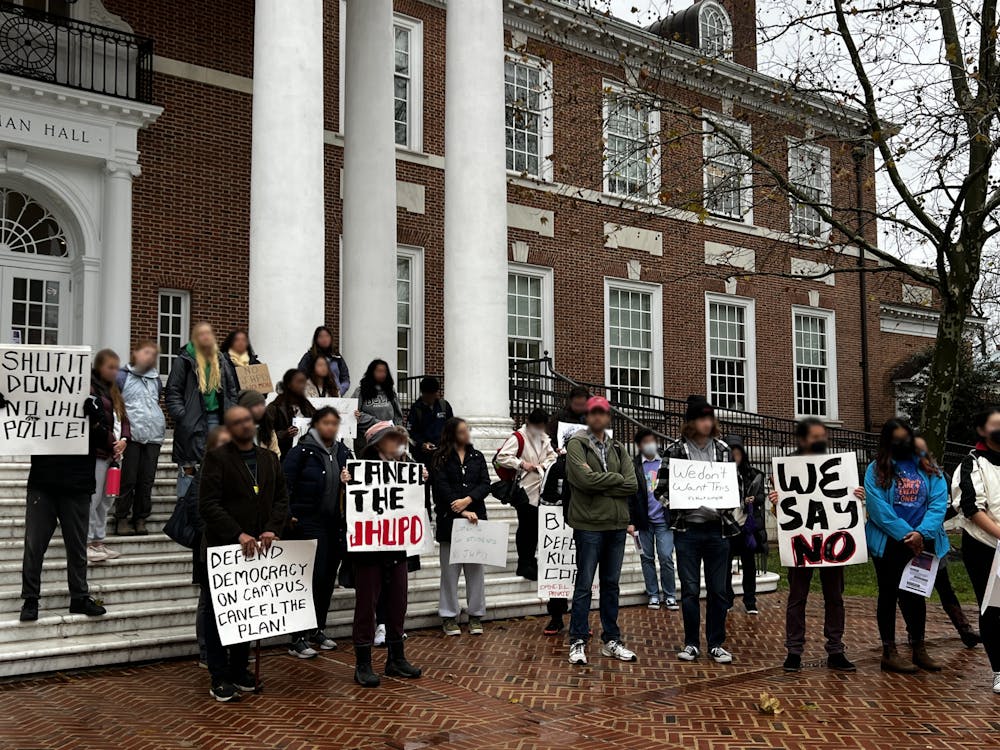Hopkins affiliates and community members engaged in a series of events to protest against the Johns Hopkins Police Department (JHPD) on Nov. 29. The event started with a walk-out at 12:30 p.m., followed by a protest march from 1 p.m. to 3 p.m. and ended with a vigil at 5 p.m at the Homewood Museum. The march took place around the Homewood campus, starting at Gilman Hall and ending at the Beach, with checkpoints at Homewood Field and Wyman Park.
Attendees were also encouraged to join West Wednesday, a weekly demonstration fighting for accountability for Tyrone West and all victims of police brutality, at 6:30 p.m. at City Hall.
During the walk-out, senior Jayla Scott shared some of their concerns regarding the impacts of the JHPD on the surrounding community.
“When you police Hopkins students and staff for their safety, you’re also policing community members. You are policing marginalized communities... people struggling with substance abuse, people who have mental illness, people who have historically never been kept safe by the police,“ they said. “It’s important for us to say that we will not accept safety that does not extend to everyone.”
Baltimore residents voted to establish local control of the Baltimore Police Department (BPD) on Nov. 8. This means the Maryland General Assembly will no longer have statutory authority over the BPD, and the Baltimore City Council now has authority over the BPD, with Police Commissioner Michael Harrison as the head of the department. Due to this transfer of authority, the BPD will be experiencing changes as the department and city work to establish local control.
Given the upcoming changes to the BPD, event organizers demanded that Harrison not sign the JHPD Memorandum of Understanding (MOU), which outlines key operational policies and jurisdiction of the JHPD in accordance with BPD.
In an interview with The News-Letter, senior Bonnie Jin emphasized how the Hopkins and Baltimore community has been protesting against the JHPD since her first year at Hopkins. She shared her frustration with the lack of acknowledgment and action from the University.
“I have been at Hopkins since 2017 and in 2018, [the private police force] was first announced publicly. I was at the first march around campus in 2018. It is absolutely ridiculous that as I am ending my time at Hopkins, we are still having this conversation,” she said. “If Hopkins cares about public safety and the safety of the students and the surrounding community, they would not go forward with this proposal.”
Junior DJ Quezada explained how students, being one of the main constituencies at the school, have a prime opportunity to condemn policing as a way for public safety in an interview with The News-Letter.
“I don’t believe the JHPD should play the role society ascribes it to, and students should show up and voice that this isn’t being done in our name,” he said.
Students, faculty and community members held a vigil at the steps of the Homewood Museum to honor the lives of the 16 people murdered by police in the U.S. from Nov. 21 to Nov. 29. Former Baltimore City public school teacher Bill Bleich led attendees in repeating the names of those killed.
Bleich went on to list several reasons he believes the University should not implement the JHPD. These included the fact that, even after population adjustment, police kill more people annually now than people lynched annually during the Jim Crow period, the University’s history of racism in Baltimore and the history of universities’ private police forces.
In an interview with The News-Letter, Bleich elaborated on the history of private police forces at Universities.
“Most of the private colleges that have their own armed police forces set them up in the 60s, and it was not about providing safety for students,” he said. “It was about trying to control civil rights demonstrations and demonstrations against the Vietnam war, so it’s not a good history.”
Bleich also cited statistics gathered by the former Hopkins student organization, Students Against Private Police, about suspects detained by the University’s security. They found that 75.9% of suspects were Black, 1.9% were white and 22.2% had no racial background reported. Bleich found this indicative of the University’s security engaging in racial profiling.
Bleich claimed that the internal review board for the JHPD would be problematic since it would only allow for discipline of a JHPD officer if agreed upon by a panel consisting of other JHPD officers.
Junior Rachel Fink conveyed how she believes that the private police force doesn’t align with the values of the student body, faculty groups and community members in an interview with The News-Letter.
“Listen to your students, especially your students of color,” she said. “People have been protesting this for years, and it is absurd that [President Ronald J. Daniels] is talking about universities and democracy but is not respecting democracy on his own campus.”
Fink called on the University to listen to the demands of Hopkins students, staff and Baltimore community residents.
Likewise Jin expressed how she believes that the University is a space of democracy, but going through with the proposal for the JHPD is against the ideals that Daniels has promoted regarding democratic engagement.
“If the University administration truly wants to show to not only students but the community and the world that [Hopkins] is a space in which students can practice democracy, protest freely and express what they want, they would not go through with this proposal,” she said.
The News-Letter reached out to University administrators for comment but did not receive a response by press time.





